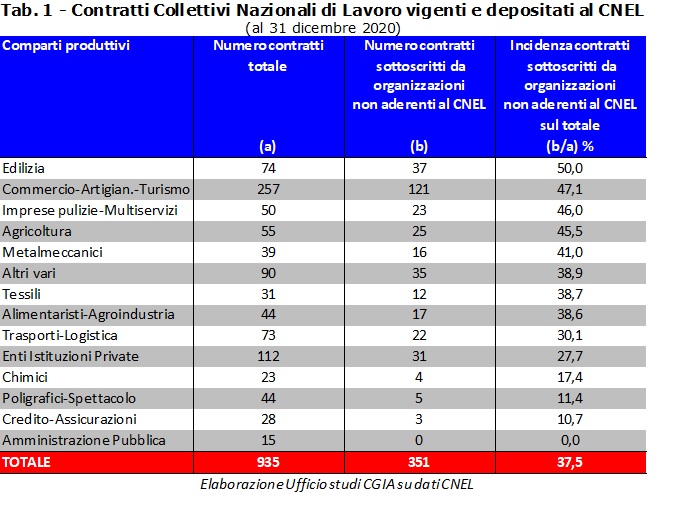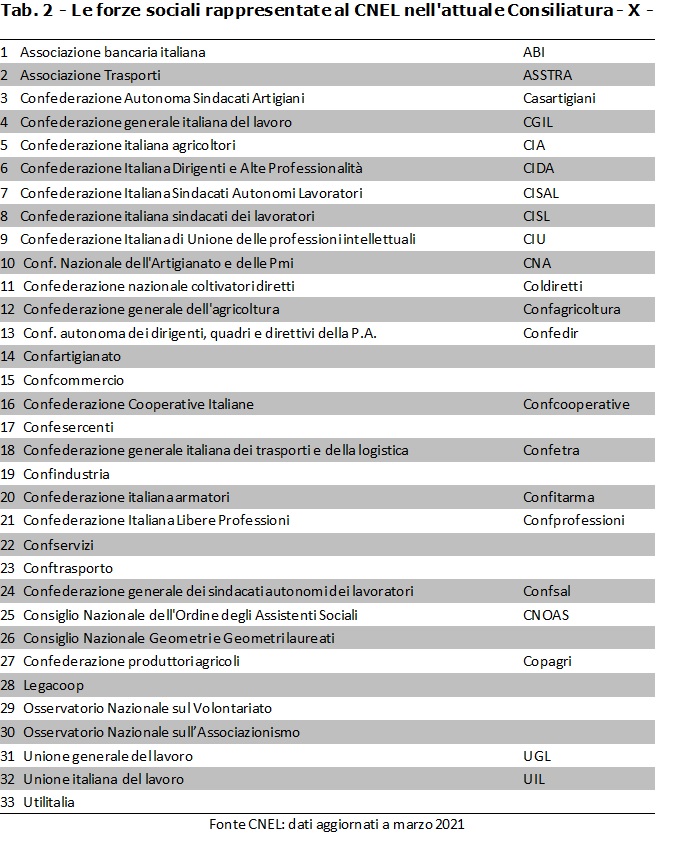At risk of rights, legality and safety in the workplace
Out of 935 National Collective Labor Agreements (CCNL) in force and filed with the CNEL by 31 December last, 351 were signed by employers' associations and trade union organizations not recognized by the National Council itself: practically 4 out of 10, precisely 37,5 percent of the total. To say it is the CGIA Studies Office.

• It is not the "far west", but we are close to it
Mind you, no one questions trade union freedom which, in a democratic country, must always be guaranteed. However, it is not a mystery that often “ghost” trade unions that do not represent anyone, or almost anyone, sign national employment contracts that many correctly define as “pirates”. Let me be clear: we are not in the "far west", but in some production chains we are close to it. These are agreements that often demolish the most elementary rights, weaken legality, promote precariousness, threaten safety in the workplace, frighteningly compressing wage levels. Strongly downward agreements that create unfair competition by delegitimizing those organizations that, on the other hand, have trade union representation present throughout the national territory, made up of history, work culture and doing business, members, offices in which thousands and thousands operate of employees who provide services to millions of businesses and millions of employees.
• CNEL has the task of “checking” the regularity of contracts
At a time when the world of work is experiencing very deep social tensions, according to the CGIA, the time has come to review the system of representation, allowing employers and trade union organizations that are recognized by the CNEL (see Tab. 2) the ownership of signing agreements-employment contracts at national and local level, while all the other acronyms that sign a new national collective labor agreement should be “certified” by a third public institution which, for example, could be the CNEL. Without this "stamp", the contract could not be applied until the parties make the required corrections. Alternatively, a parliamentary law could establish the minimum dimensional requirements that the organizations representing workers and companies must possess in order to be defined as such, thus being able to sign a collective labor agreement on a national basis. A solution, the latter, easier said than done, given that the social partners have been talking about it for at least 40 years, but concrete results have not yet been seen.

• With the release of layoffs, 70 employees at risk from July. Due to Covid, almost 900 thousand have already lost their jobs
Except for last-minute changes, the release of layoffs for large companies starts next July 1st. It is very difficult to predict what will happen. In the memo on the Sostegni bis decree presented to the Budget Commission of the House on 8 June, the Parliamentary Budget Office (UPB) estimated that the release of the layoffs that will start in the next few days will lead to the loss of 70 thousand jobs. According to the UPB President, Giuseppe Pisauro, these will be concentrated mainly in industry and "will plausibly be staggered over time as the opportunities for turnover and recomposition of the workforce materialize ...". Overall, however, despite the freeze on layoffs, the decrease in employment was very important. According to Istat, in fact, between the first quarter of 2020 and the same period of this year the number of employees decreased by 889 thousand units (-3,9 percent): the collapse involved employees (-576 thousand, -3,2 per cent), especially if term and independent (-313 thousand, -6 per cent). Of the 2 million and 643 thousand unemployed currently in the country, one million 364 thousand (equal to 51,6 percent of the total) have been out of work for more than a year.
• "Abnormal" contracts proliferate in construction and services
As we have previously reported, of the 935 national collective labor agreements in the country, 351 were signed by employers' associations and trade unions for employees not registered with the CNEL. A jumble of unlikely organizations that in the vast majority of cases represent almost no one, but allow an alternative to those companies and employees who want to do social dumping, bypassing the contracts signed by the most representative organizations and spread throughout the national territory . Of all sectors, the most critical situation is found in construction. Against 74 national collective labor agreements deposited with the CNEL, 37 (equal to 50 per cent of the total) were signed by organizations not belonging to the Viale Lubin structure. We recall, among other things, that activity on construction sites is the most at risk for the number of accidents and deaths in the workplace. Equally "anomalous" is the situation that occurs in trade / crafts / tourism. Of the 257 national collective labor agreements in force, 121 (equal to 47,1 percent of the total) were signed by “fictitious” acronyms. Among cleaning companies and multiservices, of the 50 contracts in force 23 (equal to 46 per cent of the total) were signed by almost “unknown” acronyms.
• Minimum wage by law? No need, it's already there
Even in the craft sector, which has the lowest wage levels among all the economic sectors present in the country, the main national labor contracts already present minimum gross hourly thresholds exceeding 9 euros. Level, the latter, which has been required by law by some government political forces. However, the CGIA would like to point out that it is very reductive to focus exclusively on the gross hourly wage. When the social partners renew an employment contract, in establishing the strictly salary aspects, other institutions are also taken into consideration that do not have a direct impact on the paycheck, but are equally important, as they make up the so-called deferred salary. We refer to holidays, leave, sickness, motherhood, training, etc. If, moreover, we also take into account overtime, the severance pay, the thirteenth / fourteenth month salary and, where they exist, company welfare and territorial supplementary contracts, already today the minimum hourly wage of workers affected by national collective agreements is clearly higher than 9 gross euros. Another thing, however, is to say: "Let's eliminate economic exploitation by hitting those who sign agreements with the maximum discount", that is, the agreements signed by the "fictitious" acronyms mentioned above. Well, if this is the goal, the solution must be sought by “marginalizing” these realities, subjecting the national collective labor agreements signed by the latter to the “attention” of a third public entity, such as the CNEL.
